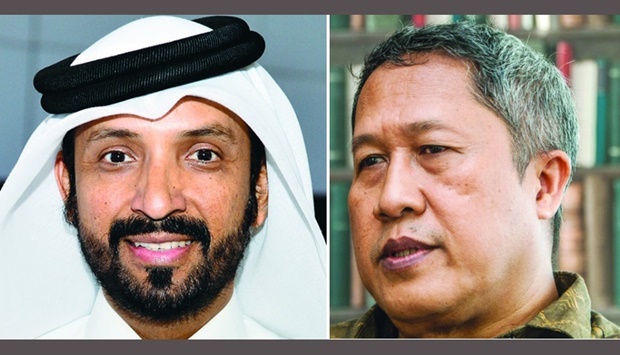The Indonesia-Qatar Business Dialogue, which will be held on March 17, will feature leading officials from both countries to speak about ways to further strengthen bilateral trade and economic ties.
“The business dialogue is intended to realise plans and initiatives that have been discussed before the pandemic by expanding the choice of traded products. The webinars are also intended to introduce potential investment shares in Indonesia in the fields of data centre and renewable resources projects, among others.
“Business co-operation can also be carried out in the field of sports, especially football and higher education. Several top universities in Indonesia are ready to co-operate with Qatar,” Indonesia-Qatar Business Council (IQBC) president Hendra Hartono Turman told Gulf Times.
Titled ‘Optimising Bilateral Collaboration Between Indonesia & Qatar: Recover Together – Recover Stronger’, the business dialogue would include the following strategies and initiatives: ways for all parties to collaborate on strategies needed on sustaining economic activity, as well as a recommendation for a memorandum of understanding (MoU) and agreement on several key initiatives between all parties, Turman said.
Qatar-Indonesia Business Council (QIBC) president Farhan al-Sayed also said the business dialogue would be held at a time when the Covid-19 pandemic is subsiding, which opens an opportunity for both countries to grow their trade relations.
“The supply chain between Qatar and Indonesia is in very good shape, thanks to the state-of-the-art facilities of Hamad Port, and to Qatar Airways, which plies regular routes between the two countries.
“Qatar and Indonesia have a lot to trade, not only in the hydrocarbons industry, but also in non-hydrocarbons, considering that the Southeast Asian nation also specialises in manufactured goods, textiles, leather, building materials, food products, and metals, among many others,” al-Sayed pointed out.
He added: “We cannot also discount the role played by Indonesia in innovation and technology. Digital lifestyle and services, such as e-commerce, mobile apps, and web design, as well as in sectors involving tourism, banking and finance, and insurance are also areas where Indonesia has been excelling.”
“The business dialogue is intended to realise plans and initiatives that have been discussed before the pandemic by expanding the choice of traded products. The webinars are also intended to introduce potential investment shares in Indonesia in the fields of data centre and renewable resources projects, among others.
“Business co-operation can also be carried out in the field of sports, especially football and higher education. Several top universities in Indonesia are ready to co-operate with Qatar,” Indonesia-Qatar Business Council (IQBC) president Hendra Hartono Turman told Gulf Times.
Titled ‘Optimising Bilateral Collaboration Between Indonesia & Qatar: Recover Together – Recover Stronger’, the business dialogue would include the following strategies and initiatives: ways for all parties to collaborate on strategies needed on sustaining economic activity, as well as a recommendation for a memorandum of understanding (MoU) and agreement on several key initiatives between all parties, Turman said.
Qatar-Indonesia Business Council (QIBC) president Farhan al-Sayed also said the business dialogue would be held at a time when the Covid-19 pandemic is subsiding, which opens an opportunity for both countries to grow their trade relations.
“The supply chain between Qatar and Indonesia is in very good shape, thanks to the state-of-the-art facilities of Hamad Port, and to Qatar Airways, which plies regular routes between the two countries.
“Qatar and Indonesia have a lot to trade, not only in the hydrocarbons industry, but also in non-hydrocarbons, considering that the Southeast Asian nation also specialises in manufactured goods, textiles, leather, building materials, food products, and metals, among many others,” al-Sayed pointed out.
He added: “We cannot also discount the role played by Indonesia in innovation and technology. Digital lifestyle and services, such as e-commerce, mobile apps, and web design, as well as in sectors involving tourism, banking and finance, and insurance are also areas where Indonesia has been excelling.”


